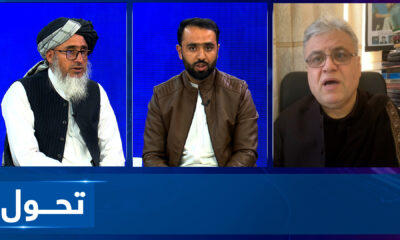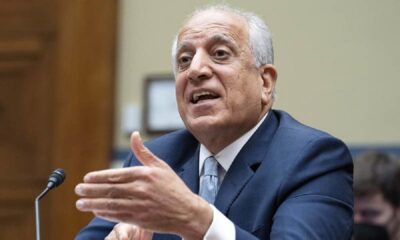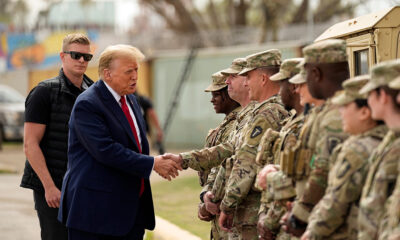COVID-19
Fight to end virus pandemic takes place on UN’s sidelines

In four days of fiery speeches over war, climate change and the threat of nuclear weapons, one issue felt like an afterthought during this year’s U.N. General Assembly: the coronavirus pandemic, The Associated Press reported.
Masks were often pulled below chins — or not worn at all — and any mention of COVID-19 by world leaders typically came at the tail-end of a long list of grievances.
But on the sidelines of the annual meeting, the pandemic was still very much part of the conversation, AP reported.
On Thursday, U.N. Secretary-General Antonio Guterres gathered with World Health Organization chief Tedros Adhanom Ghebreyesus, UNICEF Executive Director Catherine Russell and others to discuss equitable access to COVID vaccines, tests and treatments.
And earlier that day, U.S. Ambassador to the U.N. Linda Thomas-Greenfield joined leaders from around the globe to mark the progress that has been made to fight COVID-19 — including the more than 620 million vaccine doses to 116 countries and economies that the United States has provided. But she emphasized there is still much work to do.
Tedros noted that the number of deaths around the globe is near its lowest since the pandemic began, and two-thirds of the world’s population is vaccinated. But the encouraging signs mask a deep disparity between wealthy and poor countries.
For instance, only 19% of people living in low-income countries are fully vaccinated compared with 75% in high-income countries. And only 35% of health care workers and 31% of older populations in lower-income countries are fully vaccinated and boosted.
Key to closing those gaps, according to Guterres, is countering misinformation about vaccines and overcoming hesitancy while also increasing testing to snuff out the potential for more variants. The world also needs early warning systems for pandemics and must ensure a well-paid and well-supplied workforce in the health care sector.
“Let’s get it done,” Guterres said. “Let’s end this pandemic once and for all.”
Thomas-Greenfield said that COVID-19 care needs to be shifted from being offered primarily in emergency facilities to integrating it in routine services.
She outlined three new initiatives: a pilot program to be launched in 10 countries to help people get screened for COVID-19 and receive antiviral medications; a $50 million commitment from the U.S to improve access to medical oxygen critical for treating patients with severe cases; and a global clearinghouse to make medical supply chains more resilient, efficient and equitable.
While few would argue that the situation has not improved — and indeed U.S. President Joe Biden recently remarked that the pandemic was over before walking back his comments — no one on Thursday was ready to call it quits.
“A marathon runner does not stop when the finish line comes into view,” Tedros said, and instead runs harder to get to the end.
COVID-19
WHO declares end to COVID global health emergency

The World Health Organization said Friday that COVID-19 no longer qualifies as a global emergency, marking a symbolic end to the devastating coronavirus pandemic that triggered once-unthinkable lockdowns, upended economies and killed millions of people worldwide.
The announcement, made more than three years after WHO declared the coronavirus an international crisis, offers some relief, if not an ending, to a pandemic that stirred fear and suspicion, hand-wringing and finger-pointing across the globe, AP reported.
The U.N. health agency’s officials said that even though the emergency phase was over, the pandemic hasn’t finished, noting recent spikes in cases in Southeast Asia and the Middle East.
WHO says thousands of people are still dying from the virus every week, and millions of others are suffering from debilitating, long-term effects.
“It’s with great hope that I declare COVID-19 over as a global health emergency,” WHO Director-General Tedros Adhanom Ghebreyesus said.
“That does not mean COVID-19 is over as a global health threat,” he said, warning that new variants could yet emerge. Tedros noted that while the official COVID-19 death toll was 7 million, the real figure was estimated to be at least 20 million.
Tedros said the pandemic had been on a downward trend for more than a year, acknowledging that most countries have already returned to life before COVID-19.
He bemoaned the damage that COVID-19 had done to the global community, saying the pandemic had shattered businesses, exacerbated political divisions, led to the spread of misinformation and plunged millions into poverty.
When the U.N. health agency first declared the coronavirus to be an international crisis on Jan. 30, 2020, it hadn’t yet been named COVID-19 and there were no major outbreaks beyond China.
More than three years later, the virus has caused an estimated 764 million cases globally and about 5 billion people have received at least one dose of vaccine.
In the U.S., the public health emergency declaration made regarding COVID-19 is set to expire on May 11, when wide-ranging measures to support the pandemic response, including vaccine mandates, will end. Many other countries, including Germany, France and Britain, dropped most of their provisions against the pandemic last year.
When Tedros declared COVID-19 to be an emergency in 2020, he said his greatest fear was the virus’ potential to spread in countries with weak health systems.
Most recently, WHO has struggled to investigate the origins of the coronavirus, a challenging scientific endeavor that has also become politically fraught.
COVID-19
COVID-19 in Iran: Nearly 900 new cases, 24 deaths recorded

The Iranian health ministry announced on Sunday that more than 890 new cases of COVID-19 have been identified across the country during the past 24 hours, adding that 24 patients have died in the same period of time, Fars News Agency reported.
"A sum of 891 new patients infected with COVID-19 have been identified in the country based on confirmed diagnosis criteria during the past 24 hours," the Iranian Health Ministry's Public Relations Center said on Sunday, adding, "454 patients have been hospitalized during the same time span."
The ministry’s public relations center said 611 people infected with COVID-19 are in critical condition.
COVID-19
China says 200 million treated, pandemic ‘decisively’ beaten

China says more than 200 million of its citizens have been diagnosed and treated for COVID-19 since it lifted strict containment measures beginning in November.
With 800,000 of the most critically ill patients having recovered, China has “decisively beaten” the pandemic, according to notes from a meeting of the ruling Communist Party’s all-powerful Politburo Standing Committee presided over by President and party leader Xi Jinping, AP reported.
China enforced some of the world’s most draconian lockdowns, quarantines and travel restrictions and still faces questions about the origins of the virus that was first detected in the central Chinese city of Wuhan in late 2019. Heavy-handed enforcement prompted rare anti-government protests and took a heavy toll on the world’s second-largest economy.
The official Xinhua News Agency quoted Xi as saying that policies to control the outbreak had been “entirely correct.” The abrupt lifting in November and December of the “zero COVID” policy that had sought to eliminate all cases of the virus led to a surge in infections that temporarily overwhelmed hospitals.
Case numbers have since peaked and life has largely returned to normal, although international travel in and out of China has yet to return to pre-pandemic levels.
China is now transitioning to a post-pandemic stage after a fight against the outbreak that was “extraordinary in the extreme,” Xinhua said.
The government will continue to “optimize and adjust prevention and control policies and measures according to the times and situations with a strong historical responsibility and strong strategic determination,” Xinhua said.
-

 World4 days ago
World4 days agoBiden is sending aid to help Ukraine keep fighting next year, Blinken says
-

 Tahawol4 days ago
Tahawol4 days agoTahawol: NATO’s concern over proximity of Russia & North Korea discussed
-

 Latest News4 days ago
Latest News4 days agoIEA committed to freedom of media within Islamic principles: Mujahid
-

 Latest News4 days ago
Latest News4 days agoIEA prioritizing poverty reduction and job opportunities, says deputy PM
-

 4 days ago
4 days agoAWCC customer in Kandahar wins 1 million AFN in ‘lucky lottery’
-

 Latest News5 days ago
Latest News5 days agoIEA cuts mobile phone and internet rates
-

 Latest News4 days ago
Latest News4 days agoKhalilzad: Turning our back on Afghanistan would not be wise
-

 World5 days ago
World5 days agoChina’s largest air show off to flying start with fighter jets and attack drones
























